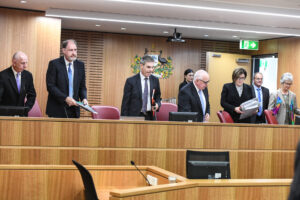The March quarter GDP figures show that while the economy is growing strongly, workers are missing out of their fair share.
The national accounts released on Wednesday revealed that in the first 3 months of 2022 a record level of national income is going to corporate profits. At the same time real unit labour costs for non-farm workers fell 2.3%. Labour market and fiscal policy director, Greg Jericho, notes in his column in Guardian Australia that real (non-farm) unit labour costs are now 5.3% below where they were before the pandemic.
This data provides a strong fact check to arguments that workers need to take a pay cut to prevent rising inflation. The increase in inflation is not coming from labour costs, indeed workers are feeling the pain while in the words of the Bureau of Statistics, “Australian businesses benefited from rising prices.”
The GDP figures reveal that far from needing workers to be the ones who need to shoulder the burden of rising inflation, they clearly already have been the ones who have hurt the most. Asking them to continue to take real wage cuts will not help the economy, it will only exacerbate the shift of income going to profits and not to employees.


You might also like
Go Home On Time Day 2025. As full timers disconnect, part timers are doing more unpaid overtime
New research by the Centre for Future Work at The Australia Institute has revealed a disturbing new twist when it comes to unpaid overtime in Australia.
The continuing irrelevance of minimum wages to future inflation
Minimum and award wages should grow by 5 to 9 per cent this year
Want to lift workers’ productivity? Let’s start with their bosses
Business representatives sit down today with government and others to talk about productivity. Who, according to those business representatives, will need to change the way they do things?


